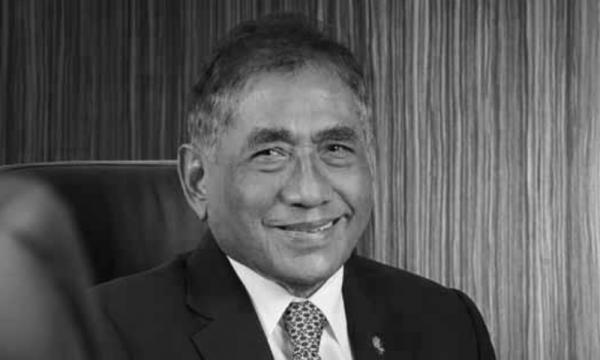COMMENT | The life of the late Mohd Ghazali Haji Che Mat was shaped by his childhood years. He witnessed both the brutality of the Japanese occupation and the Communist Party of Malaya in the aftermath of the Japanese surrender in 1945.
I had met him several times in the course of my career as a journalist, the first being when I was covering the Gonzales IV military exercise in 1980. He was already an imposing figure, held in awe by his soldiers, by politicians and by journalists.
But I only got to know him on a more personal level when I was appointed Editor-in-Chief of the New Straits Times in 2004. He was then chairman of the board.
The Ghazali I knew was a man of few words. But when he spoke, everyone listened. Some of his memories are penned in an authorised memoir – Memori Seorang Jeneral – by academics Jessica Ong Hai Liaw and emeritus professor Wan Hashim Wan Teh.
As a young military officer, Ghazali was directly involved in the war against the CPM. At the age of 27, a lieutenant then, on Nov 13, 1957, a platoon of soldiers led by him was pinned down by the Communist Party of Malaya’s Fifth Regiment which was shooting at them from higher ground.
Realising his men could be picked off one by one, Ghazali and one of his soldiers, Private Hassan Selati, stole up the hillock occupied by the enemy and opened fire. They killed two of the CPM troops and the rest fled in a flurry. He became a legend.
As a result, Ghazali, then 28, was awarded the country’s highest medal for bravery the Seri Pahlawan Gagah Perkasa on the first anniversary of Independence on Aug 31, 1958. Till this day, he remains the only Chief of Defence Forces to have received this award.
Ghazali was also in the forefront during Konfrontasi - the undeclared war by Indonesia’s president Sukarno and in keeping the peace during the bloody May 13 riots of 1969.
Save the memoir, there is not much of Ghazali’s life that can be gleaned from the Internet. But there is one point the book made which struck a chord with me – that he “loved rugby, football and athletics and from these, he learned about leadership in a team and cherished respect and tolerance towards others' beliefs in a multi-racial Malaysia”.
In 2005, I appointed Brendan Perera, an Indian, a Catholic, as Group Editor but that did not sit well with some right-wing Umno leaders and ministers who had friends on the board. The New Straits Times was substantially owned by Umno and over the years, in the late 1980s and 1990s, had become a bumiputera-centric organisation. It retained its multi-racial composition but employees had come to accept that only a bumiputera would scale the ladder to the top post – just like a non-Chinese would not expect to be the top honcho in the Malaysian Chinese Association-controlled The Star where I worked until 1987.
Staunch adherent
The cage was frequently rattled because, besides resentful journalists within the organisation, the right-wing politicians would see shadows behind every corner. Like, for example, when the Pope died and the world’s Roman Catholics waited three days for the white smoke to emerge from the Vatican to signal that a new Pope had been chosen. The NST headlined the story for all the three days on Page 1. Of course, Brendan was blamed for “promoting a Christian agenda” and I was accused of “sabotaging the Bumi agenda” because I, too, am an Indian. But the critics could not make any headway as the president of Umno and the prime minister then, Abdullah Ahmad Badawi, was himself a staunch adherent of a multi-racial Malaysia.
But it came to a head one day over an article written by one of our columnists which the agitators – which included former editors who were writing toxic blogs – said belittled bumiputeras. At a board meeting, a year or so after Brendan was appointed, a few board members agitated for Brendan to be sacked. It was a stormy meeting with directors split almost evenly.
Ghazali, who had remained silent, suddenly slammed his palms on the table when one director said, “It’s an Umno newspaper. We can’t have an Indian running it.”
I had never seen Ghazali as angry as he was then.
“Enough. I am a soldier. I fought alongside Indians, Chinese, Sikhs, Ibans, Eurasians… they spilled their blood for this country. I will not listen to any more of this. Brendan stays,” I recall him saying.
The agitating directors were stunned into silence and bowed their heads - perhaps in embarrassment, perhaps in shame. Some months later, Ghazali told me he wanted to step down as chairman. Perhaps, he saw that the NST and Malaysia had changed. I tried to persuade him to stay on but he was adamant. Perhaps he was tired of the pettiness but certainly, this was not the Malaysia he had fought for.
Ghazali was a hero; a brave soldier; a gentleman. That’s how I will remember him.
Rest in peace, General. May Allah SWT place you among his beloved.
Note: Mohd Ghazali Haji Che Mat died on July 7, 2021.
KALIMULLAH HASSAN is former editor-in-chief of New Straits Times.


